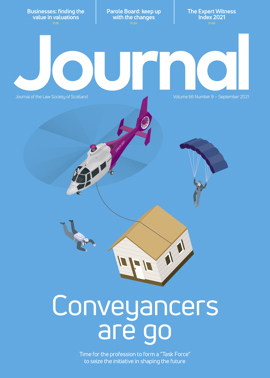When all is remote
The COVID-19 pandemic and the resulting emergency measures forced changes to the way expert witnesses work for the courts. The response from the Scottish Courts & Tribunals Service (“SCTS”) was rapid, and the first Court of Session virtual court convened with an Inner House case on 21 April 2020. The Lord President backed plans for the use of remote juries in High Court cases, and by October 2020 SCTS had developed a digital court infrastructure to allow personal injury, bail and appeal courts to operate largely virtually. SCTS anticipated that in criminal proceedings all custody cases could be conducted with parties participating remotely.
Following the Lord President’s comment that Scotland’s legal system would not return to the status quo, however, Scottish lawyers voiced their opposition to any entrenchment of remote justice. The Faculty of Advocates opposed the “growing narrative” of remote justice becoming the default position, expressing doubt over virtual hearings for complex matters or in cases with significant issues over credibility and reliability of witnesses.
Assessment via VT
For an expert witness at the time of the pandemic, there was little by way of guidelines on how to conduct remote psychological assessment for court proceedings. Experts who relied on face-to-face assessments for court purposes began to develop new ways of working using remote or virtual assessments. The expert witness advisory committee for the British Psychological Society, on which I sit, reviewed the evidence base for videolink technology (VT) and developed standards and guidelines for conducting psychological assessments of individuals remotely for the courts: British Psychological Society, Psychological assessment undertaken remotely (May 2020); Psychologist expert witnesses undertaking remote psychological assessments for courts in England & Wales, Scotland and Northern Ireland (July 2020).
Remote assessments were already recognised practice in tele-mental health, with research evidence demonstrating that the assessment of trauma and personality was comparable to face-to-face assessments; however, experts did not routinely undertake remote assessments for the courts. Practically, assessments relying on simple questions and answers appeared most suitable for VT, a view supported by a reasonable volume of evidence-based examples within clinical psychology. There are many benefits to remote assessments, such as the ease of access for clients, and smartphone or tablet-based evaluations have been shown to be as accurate as an evaluation in person. However, VT could prove problematic for assessments of persons with complex needs or complex mental disorders, where non-verbal behavioural cues and nuances are central for an accurate formulation and diagnosis.
Experts now had to consider potential threats to the validity of assessments, and associated confidence in diagnostic or other conclusions reached via VT, and were obliged to highlight any limitations of VT to the court (G Macpherson, “Expert Evidence”, in Corteen and others (eds), Forensic Psychology, Crime and Policing: Key Issues and Practical Debates (Bristol University Press, 2021)). Conducting remote assessments also raised questions over confidentiality and safeguarding of clients; however such concerns can be mitigated via discussion with the instructing party and by careful pre-assessment planning that highlights any communication or learning difficulties that may impact on the assessment process.
Evidence via VT
As with remote psychological assessments, VT was the only available medium during the pandemic through which experts could present evidence during court proceedings. The use of VT in hearing oral evidence is not new, and the England & Wales Civil Procedure Rules Practice Direction 35: Experts and Assessors (2010) made provision for oral testimony via VT where instructing agents should “give consideration, where appropriate, to experts giving evidence via a video-link”.
Many experts prefer VT testimony to in-court testimony, with over one third of experts in one pre-pandemic survey (The Times and Bond Solon Expert Witness Survey, 2017) being of the view that giving evidence via VT was more time efficient, and as effective as being present in court. Remote psychological assessments could be completed in lieu of in-person assessments rather than further delaying court proceedings. (Other experts, though, noted that interactions with counsel and the court were stilted or “sanitised” by VT.)
Practical approach
Face-to-face interviews are generally considered the gold standard when conducting complex psychological assessments for court purposes. However, where face-to-face assessments present practical challenges, or for less complex instructions, VT assessments are not only justifiable but also proven and valid methodology in which the court can have confidence. As an expert, specifying for the instructing agent what may be involved in the assessment and highlighting any limitations on the assessment at an early stage will prove useful. Practitioners will need to continue to use their clinical judgment to apply practical and clinical considerations when completing remote psychological assessments in judicial settings. For hearings, my experience of VT assessments and VT evidence to the court has been positive, and I anticipate that remote assessments and remote court hearings will continue for the foreseeable future and become increasingly recognised as valid and reliable and sanctioned by the courts.
Regulars
Perspectives
Features
Briefings
- Civil court: Legacy of COVID
- Corporate: The enigma of economic duress
- Employment: where will work be found?
- Intellectual property: David v Goliath battle continues
- Agriculture: Crofting disputes: some first principles
- Sport: Arbitration – within the rules?
- Property: ADS: the hidden traps
- In-house: On harm, stakeholders and risk management
In practice
- Ask Ash: Colleague's chat is my privacy
- Lockdown no more
- The Word of Gold: The potency of passion
- Get interactive at the Law and Technology Conference
- Ten red flags for conveyancers
- The Eternal Optimist: So, what do you want to be?
- Commissary: the top 10 failings
- Mobility challenges – and the kindness of strangers
- When all is remote







